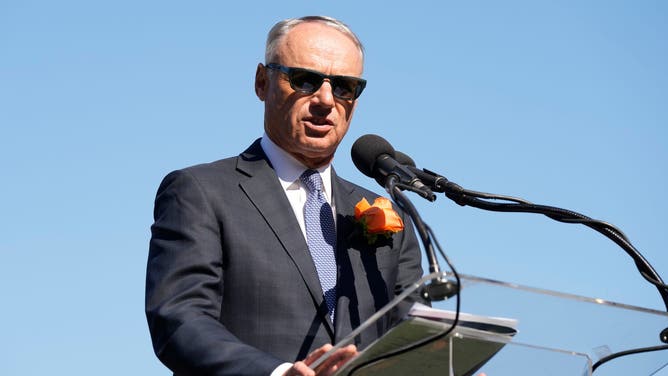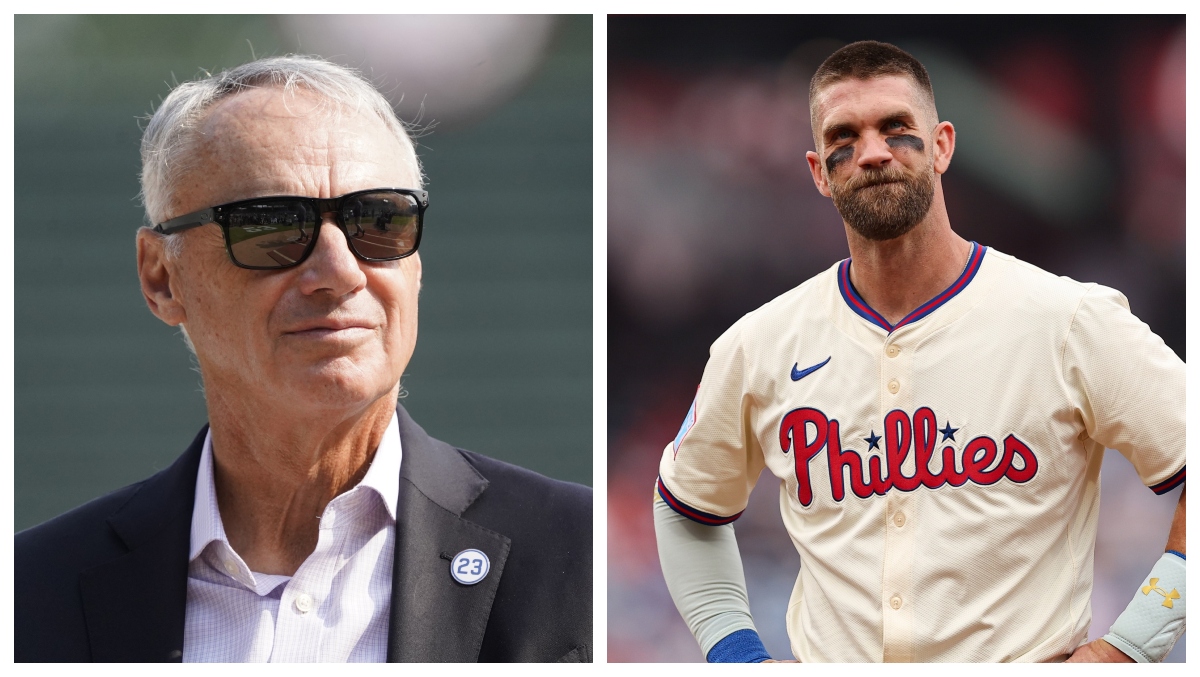League commish recently addressed the expletive-laden clubhouse incident with Phillies star
PublishedAugust 8, 2025 8:42 PM EDT•UpdatedAugust 8, 2025 8:45 PM EDT
FacebookTwitterEmailCopy Link
Major League Baseball commissioner Rob Manfred has made it clear that he intends to push for a salary cap in the next round of labor negotiations. And when the 30 owners and MLB Players Association sit down at the end of the 2026 season, that salary cap issue will become one of the most contentious issues in the league’s history.
Perhaps nothing indicates this better than Philadelphia Phillies star Bryce Harper telling Manfred exactly how he and most of the players feel about a potential salary cap.
“If you’re talking about a salary cap, you can get the f*** out,” Harper reportedly said in a clubhouse meeting.
READ: Bryce Harper Reportedly Told MLB Commissioner To ‘Get The F*** Out’ Of Phillies’ Clubhouse
For the players, a salary cap represents an effective non-starter. Cap systems generally restrict a player’s earning potential, which is part of the reason why the NFL has an average salary over $2 million lower than MLB, despite much higher revenues.
Harper’s reaction is likely shared by most of the league’s players, and Manfred finally addressed it when speaking at Wrigley Field recently. His comments don’t exactly inspire confidence.

Rob Manfred (Photo by Tony Avelar/San Francisco Giants/Getty Images)
(Getty Images)
Rob Manfred Pushing For Salary Cap, Still Thinks MLB Will Avoid Work Stoppage
Manfred downplayed the incident earlier this month, claiming they “shook hands” at the end of the conversation.
“I don’t talk about those player meetings,” Manfred said at Wrigley Field last week. “Let me say this: I think more has been made out of this than needs to be made out of it. Bryce expressed his views at the end of the meeting. We shook hands and went our separate ways. Not all that significant.”
He also expressed optimism that the two sides will “find a way” to come to an arrangement.
“It is natural that when we get to the end of a collective bargaining agreement (some) people have trepidation about what’s going to happen,” he continued. “I’m optimistic that we’ll find a way to make a deal.”
Manfred pointed to his record on labor negotiations since 1998 as evidence that the owners and players can avoid a work stoppage.
“I came in-house in 1998,” he added. “We haven’t had a work stoppage that affected a season since that time. Three of those deals, I was the chief negotiator. Two of them, I was the commissioner. That’s a pretty good record. And, you know, I think we can do it again.”
Here’s the difference: a salary cap was not the owners’ primary objective during those previous negotiations. It seems to be their primary objective now. Given the staunch and united opposition to it among the players, a lockout is virtually guaranteed. Whether it extends all the way into the 2027 season remains to be seen, but any lost games would be a disaster for a league and sport finally regaining some momentum.
As for Harper’s specific remarks, Manfred again chose to act as though it would have no impact on future relationships.
“It was an individual picking a particular way to express himself,” Manfred said. “And I don’t think you need to make more out of that than that.”
Sure.

